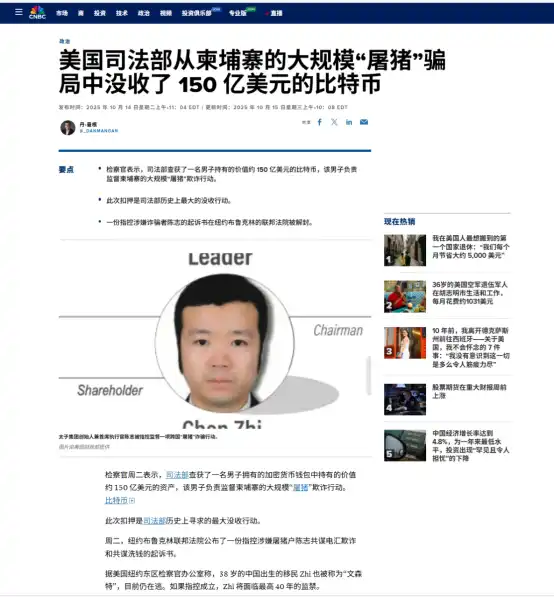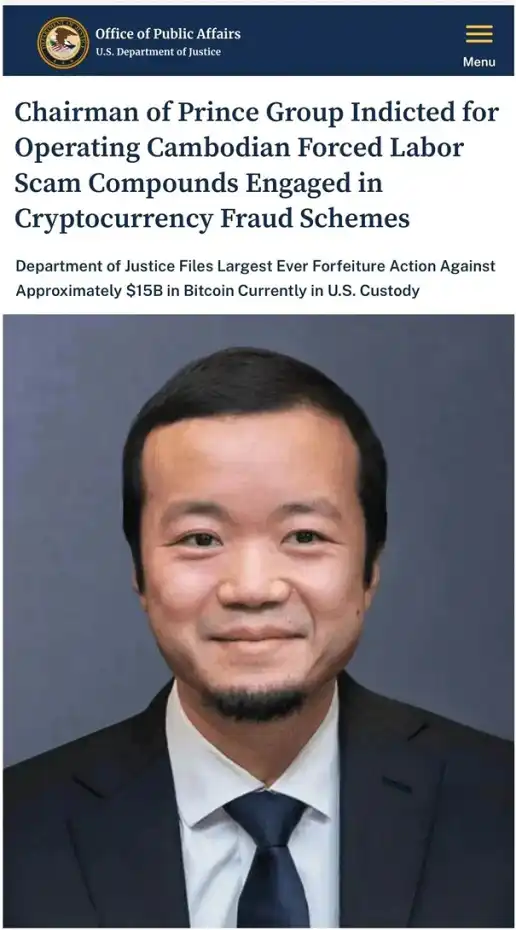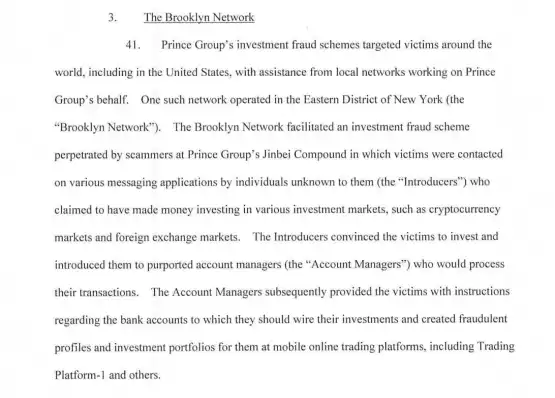Original Title: "Case Analysis | 120,000 Bitcoins Hijacked? Web3 Lawyers Deep Dive into the Regulatory Dilemma Behind the 'Prince Group' Case"
Original Source: Crypto Salad
Introduction
As global regulation of crypto assets tightens, a "blockchain pursuit" spanning Cambodia, the US, and the UK has captured everyone's attention. In October 2025, the US Treasury and Justice Departments launched the largest-ever enforcement action against the Prince Group in Cambodia, freezing up to 120,000 Bitcoins.

(Image sourced from US CNBC channel)
This case has shaken not only the blockchain industry but also challenged our traditional understanding of "financial sovereignty": How can sovereign nations technically track, legally sanction, and regain control when digital assets cross borders and flow anonymously? When the US can extend its enforcement reach through financial networks, how can we establish our own system for recovering and judicially handling digital assets?
This article will analyze the legal logic and international regulatory dilemmas behind the "Prince Group" case from four perspectives: case review, legal basis, technical loopholes, and regulatory insights, and attempt to answer an increasingly urgent question—who truly holds the sovereignty of enforcement in the digital financial era?
1. Case Review
First, let us reconstruct the specific details of the Prince Group case to analyze its significance.
In October 2025, the US Treasury (OFAC) initiated one of the largest single judicial strikes against the "Prince Group Transnational Criminal Organization," sanctioning 146 members. Subsequently, the US Justice Department (DOJ) announced charges against Chen Zhi for organizing and operating a "pig butchering" type of crypto investment scam based on forced labor parks, while also being implicated in telecommunications fraud and money laundering conspiracy. Surprisingly, the DOJ claimed to have seized over 127,000 Bitcoins.

(Image sourced from the US Department of Justice website)
How were these Bitcoins specifically scammed? It's quite simple. According to the indictment, Chen Zhi led the Prince Group in conducting large-scale online investment scams, luring victims to invest in dollars or cryptocurrencies, showing account balances or profit growth on the surface, but in reality, the funds had long been transferred away and concentrated into wallets controlled by Chen Zhi. At the same time, the Prince Group invested in or rented real mining companies like LuBian Mining and purchased computing power from the open market, creating the illusion that they were acquiring Bitcoins through mining, giving it a "legitimate generation" appearance.
Regarding such a massive cryptocurrency scam, reports indicate that China had established a special task force in Beijing to investigate this case five years ago. However, due to the time elapsed, we could not find relevant official information or news, only media reports, making it difficult to ascertain the truth. But how did the US and UK manage to control such a large amount of Bitcoin and extend their enforcement reach to far-off Cambodia?
1. Source of US Jurisdiction
The indictment clearly states that the Prince Group's scam network includes global victims, including those in the US, with a local network operating in Brooklyn, New York. Victims were lured to transfer funds into shell company accounts located in Brooklyn and Queens, which were then transferred back to accounts controlled by the Prince Group and Chen Zhi through international remittances or virtual currencies. In other words, these accounts were opened in US financial institutions and cleared through them. According to the US Constitution, as long as any part of the criminal act occurs or has consequences in the US, territorial jurisdiction is established. The indictment also specifies that since the acts and consequences occurred in the area, the case falls under the jurisdiction of the Eastern District Court of New York.

(Image sourced from the original indictment)
2. Why Was Execution Smooth?
On the criminal level, US judicial authorities issued a seizure order for the 127,271 Bitcoins and other criminal proceeds controlled by Chen Zhi under the Criminal Asset Forfeiture Act (18 U.S.C. §§ 981, 982). On the financial sanctions level, the US Treasury designated the Prince Group and its associated financial network as a "Primary Money Laundering Concern" under Section 311 of the Patriot Act (31 U.S.C. § 5318A), allowing for the immediate freezing of their accounts and transactions related to the US financial system. Coupled with the Global Magnitsky Human Rights Accountability Act (22 U.S.C. § 2656), which allows for global asset freezes and transaction bans on foreign individuals who severely violate human rights or engage in significant corruption, the US was able to act decisively.
Additionally, under Rule 41 of the Criminal Procedure and the Mutual Legal Assistance Treaty (MLAT) mechanism, the US was able to smoothly execute seizure, wanted notices, and asset disposal measures through blockchain custodial nodes, exchanges, and multilateral cooperation.
3. Technical Loophole Doubts
Why was the US able to easily freeze the Bitcoins? Beyond the powerful on-chain team behind the US, Crypto Salad also heard an interesting theory from a well-known blockchain forensics and compliance technology firm, Elliptic Blog, which we would like to share with readers:
At the end of 2020, a mining company named LuBian Mining (yes, the same one mentioned earlier) experienced a serious security incident. In short, the algorithm for generating the private key to access the Bitcoin vault had a random number vulnerability (also known as "Milk Sad"), allowing attackers to crack the private key and transfer all Bitcoins from its mining pool, reportedly amounting to exactly 127,000 Bitcoins. By June to July 2024, this batch of Bitcoins showed new activity, and the wallets involved had overlaps or merges with those controlled by the Prince Group and Chen Zhi. Ultimately, in 2025, the US Justice Department officially seized them.
Undoubtedly, a significant portion of the 120,000 Bitcoins frozen from the Prince Group originated from contributions of funds from the Chinese community. However, under the current legal and technical landscape, we can hardly recover our rightful interests. Whether or not the state has launched an investigation or taken action, the "Prince Group" case serves as a wake-up call: in the digital financial era, financial sovereignty is not only reflected in currency issuance but also in the effective exercise of enforcement sovereignty. When transnational crimes are exposed, we must have clear legal bases, mature technical systems, and resolute enforcement capabilities to truly protect and recover the assets that rightfully belong to us.
2. Conclusion
The "Prince Group" case is not the first, nor will it be the last of its kind. It profoundly reminds us that while initial regulatory policies may achieve their intended goals, they could also cause us to lose some future initiative in a new round of global financial competition.
Faced with the unavoidable trend of digital assets, we must find a new balance between "strictly controlling risks" and "grasping sovereignty." Establishing an autonomous and controllable judicial disposal system for digital assets, ensuring that our legal dignity and enforcement capabilities extend into the digital space, is an urgent topic. Only in this way can we truly achieve "lawful asset recovery" in the future, whether through confiscation, enriching the national treasury, or proportionate liquidation and returning to victims, thus completing the final loop of enforcement and effectively safeguarding the property security of the people.
This article is from a submission and does not represent the views of BlockBeats.
免责声明:本文章仅代表作者个人观点,不代表本平台的立场和观点。本文章仅供信息分享,不构成对任何人的任何投资建议。用户与作者之间的任何争议,与本平台无关。如网页中刊载的文章或图片涉及侵权,请提供相关的权利证明和身份证明发送邮件到support@aicoin.com,本平台相关工作人员将会进行核查。




